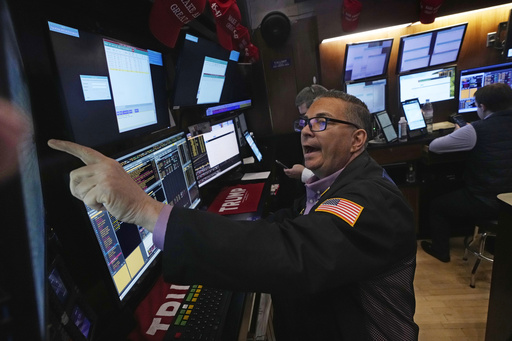
NEW YORK — U.S. stock markets showed little movement on Tuesday following President Donald Trump’s recent announcement about increasing tariffs, alongside remarks from the Federal Reserve Chair suggesting that interest rates might remain stable for an extended period.
During the session, the S&P 500 remained largely flat as it reacted to Trump’s declaration of a 25% tariff on all imported steel and aluminum. As of 11:15 a.m. Eastern Time, the Dow Jones Industrial Average gained 42 points, a slight increase of 0.1%, while the Nasdaq composite saw a marginal decrease of 0.1%.
Market activity was muted not only in equities but also in the bond sector, with Treasury yields showing only a slight rise. The ongoing threat of a trade conflict looms large, with significant implications for the economy. Many financial analysts on Wall Street believe that prolonged tariffs could increase costs for American families and ultimately have a detrimental impact on the stock market. Following Trump’s announcement, Ursula von der Leyen, president of the European Commission, responded by stating that “unjustified tariffs on the EU will not go unanswered,” hinting at commensurate counteractions.
Historically, Trump has demonstrated a willingness to retract such threats, as seen in his earlier 25% tariffs proposed for imports from Canada and Mexico, suggesting that these measures might be more of a negotiation tactic than a steadfast policy. This has led many investors to remain optimistic that the worst-case scenarios may be averted. “The metal tariffs may serve as negotiating leverage,” noted Solita Marcelli, chief investment officer for the Americas at UBS Global Wealth Management.
Shifting attention to another Washington update, Federal Reserve Chair Jerome Powell reiterated that the Fed is not in a rush to further lower interest rates during his Capitol Hill testimony. The central bank had made considerable rate cuts throughout the latter part of the previous year with hopes of stimulating job growth and overall economic activity. However, persistent inflationary concerns have tempered expectations regarding additional rate cuts in 2025, with some traders even speculating that there may be no cuts at all, particularly due to tariff-related issues.
Powell expressed a sense of confidence in the current economic landscape, stating, “We’re in a pretty good place.” He acknowledged the potential risks of both moving too slowly, which could harm the economy, and acting too quickly, which might drive inflation higher. Rising interest rates can exert downward pressure on investment prices and could hinder economic growth by increasing borrowing costs. This poses risks for a stock market that some critics believe is already overpriced.
In order to counterbalance these pressures, companies need to report robust profits, and many major U.S. firms have delivered strong earnings during this reporting quarter. However, not all positive outcomes have reassured investors. For instance, Marriott International’s stock fell by 4.7% after exceeding profit expectations for the last quarter, as investors were disappointed with its lower-than-expected profit forecast for the upcoming year.
Conversely, DuPont’s shares jumped 7.2% following better-than-expected profit results, driven by robust demand in its electronics sector, which the company plans to spin off later this year. Coca-Cola also saw a 3.2% rise after reporting profits and revenue that surpassed analysts’ forecasts, fueled by growth in China, Brazil, and the United States.
In the bond market, the yield on the 10-year Treasury increased slightly to 4.52% from Monday’s 4.50%. The two-year Treasury yield, closely aligned with anticipated Fed actions, remained unchanged at 4.28%.
Internationally, stock indexes exhibited a mixed performance across Europe and Asia. The Hang Seng index in Hong Kong decreased by 1.1%, whereas South Korea’s Kospi index increased by 0.7%. Japanese markets were closed in observance of a national holiday.
Trump has been advancing his agenda with 10% tariffs on Chinese imports, while China has retaliated by imposing tariffs on U.S. coal, liquefied natural gas, crude oil, agricultural machinery, and large-engine vehicles. Vishnu Varathan, head of macro research at Mizuho, noted that China’s limited response indicates a strategic choice to avoid escalating tensions further. He remarked, “Nonetheless, the reality is that U.S.-China trade tensions are set to structurally ramp up, even if a negotiated compromise remains the intended outcome.”

